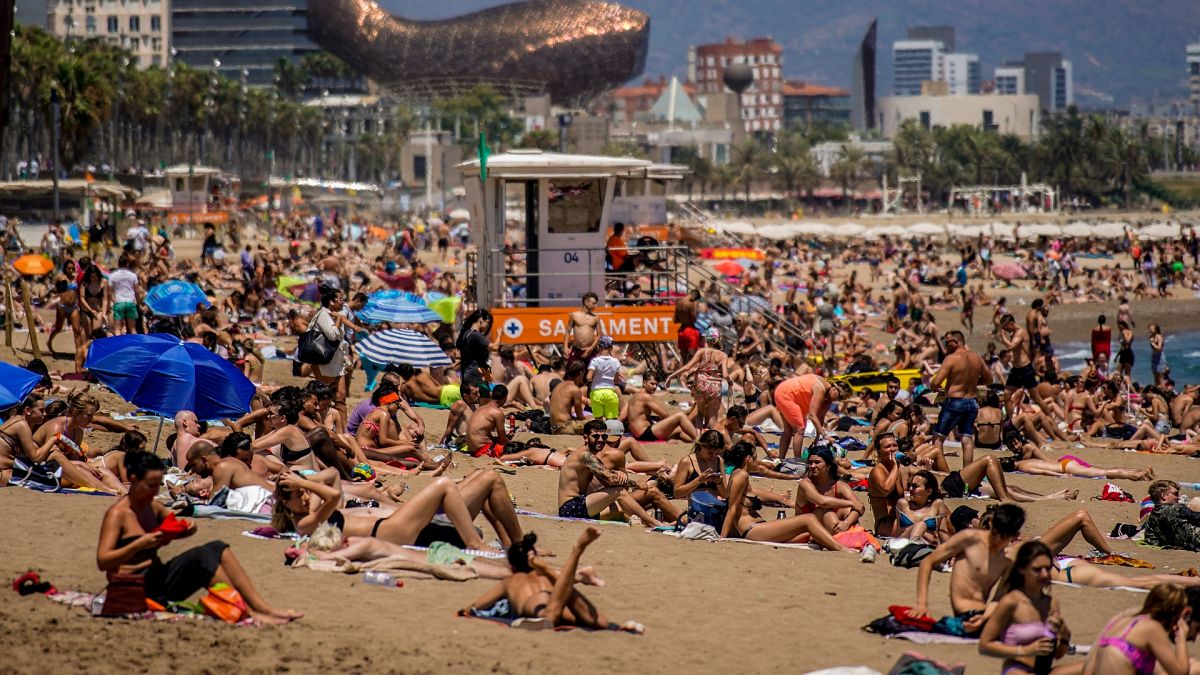Rain is falling consistently in Barcelona for the first time in almost four years. Catalonia’s longest drought since records began is coming to an end, bringing the first ‘normal’ spring and much-needed respite as the tourist season begins.
As the reservoirs fill past their previously critically low condition, many hundreds of thousands of festival goers will fly to Barcelona in May for Primavera Sound. It is one of the largest music festivals in all of Europe.
As it begins its two-week run, Primavera Sound is the gunshot marking the beginning of the summer season which sees tourists flock to the Catalan capital from May until September.
And though recent rainfall has rescinded the region's drought emergency, the experience has left many residents and officials wondering if the relationship between Barcelona and tourism will be sustainable when the next drought inevitably comes.
Is tourism too big for water restrictions?
Primavera saw over 460,000 attendees from across the world in 2022 generating €349 million in revenue for the city of Barcelona.
Even amidst the worsening water situation throughout 2023, few restrictions were placed on the tourist sector. As the city closed out 2023 with over 12 million tourists having stayed in hotels, tourist lets and hostels, the Manager’s Office for Economy and Economic Promotion put tourist spending at €9.6 billion.
Tourism is one of the leading economic sectors for Barcelona and the surrounding region, responsible for more than 10 per cent of local GDP in 2021, and accounting for 5.4 per cent of Catalonia’s overall GDP in 2022.
As the industry is so important to the economy of the city, there were many questions raised around the declaration of a drought emergency in February. As individual residents were limited to 200 litres of water per day, facing additional payments for exceeding this limit, there were fewer restrictions for the tourism sector beyond emptying pools, advisory signs and water usage recommendations.
“We are aware that water use awareness campaigns are being carried out in the hotel sector with the aim of making customers aware,” Elvira Garcia, General Manager at Barcelona Oberta, a Union of commerce and tourism hubs in Barcelona told Euronews Green.
“In this sense, there are stickers or information in public toilets or a time of four minutes is recommended for showering.”
What lessons have been learnt from the drought?
Although it seems the worst is over, the drought has been a large part of residents' lives, even seeping into politics with candidates of the Catalan regional elections in May addressing the issue of water security.
Director of the Catalan Water Research Institute (ICRA), Vicenç Acuña Salazar, knows first-hand the inequalities that water scarcity has brought - especially in the tourist sector.
“The drought hasn’t finished officially, and we will see what happens, especially next fall. If the next fall is as dry as the last three falls then in winter we will be again in an emergency, and there will be shortages for almost all sectors, but for now, the summer is solved,” he explained to Euronews Green.
For Vicenç and many others, the need to inform tourists of water scarcity, as well as establishing great autonomy from rainfall is a key factor in making Barcelona less susceptible to future drought.
“We are starting to put together a group of stakeholders from the touristic sector, people from the Spanish Association of Hotels and hopefully the Ministry of Environment from Spain and develop and implement a system for measuring water usage on tourist activities.”
“So that whenever you have to choose which hotel you have to visit you can see their water use efficiency, if they have invested in recovering rainwater and then reusing it in the hotel, and these kinds of practices.”
How is Barcelona adapting to drought?
It is a balancing act in Barcelona between concentrated periods of tourism during the summer and water usage during the worst months of the drought. It has highlighted how susceptible the city is to water shortages and why its tourism industry needs better water management strategies.
The Catalan government will invest nearly €2.5 billion in the Catalan Water Agency (ACA) to manage water supplies and address future droughts. The plan, running from this year until 2027, will triple previous investments, expanding the number of water production plants from 24 to 40 and boosting production from Barcelona’s Besos River.
In 2024, a floating desalination plant will be installed off Barcelona’s coast, producing 14 hm³ of water annually - 6 per cent of the metropolitan area’s consumption - as well as the building of 12 mobile desalination units deployed along the northern Costa Brava, starting in June.
These units, costing €10 million, will supply 1,000 m³ of water daily, covering 35 per cent of water consumption in over a dozen municipalities.
Recent rain has meant Barcelona has narrowly avoided effecting much change to its tourist sector, buying more time to prepare for the inevitable ‘next time’.
“Mass tourism is not part of the city strategy we want. Companies are aware that the path is sustainability,” Elvira Garcia tells Euronews Green.
As increased heatwaves and more sparse rainfall affect much of Spain and the Mediterranean region, new methods will have to be implemented to ensure the short-term benefits of tourism on the region’s economy and the long-term sustainability of water.


